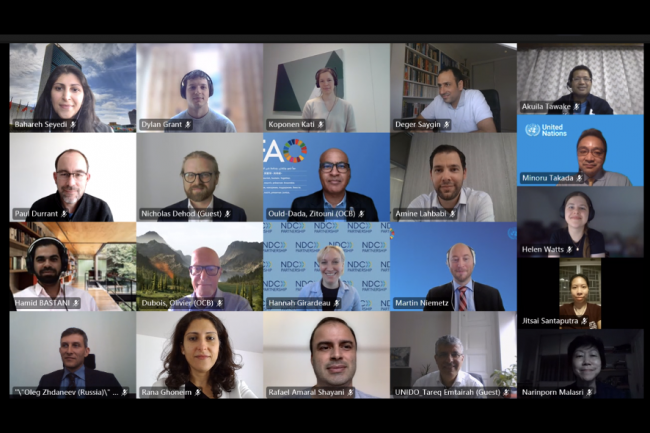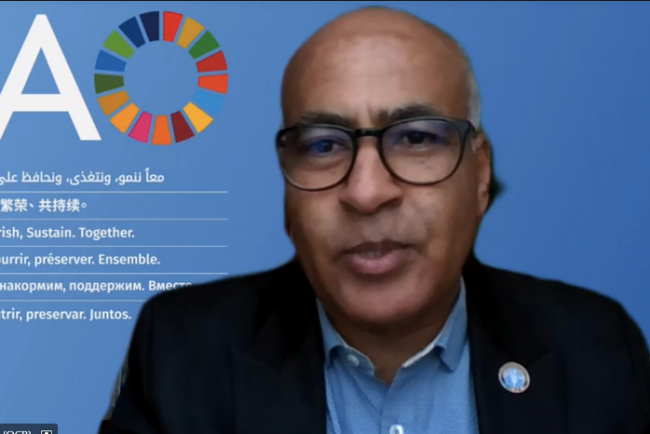The Technical Working Group on Innovation, Technology and Data held its final meeting to review the draft report as revised by the Group’s three co-leading agencies: the UN Industrial Development Organization (UNIDO), the Food and Agriculture Organization of the UN (FAO), and the UN Human Settlements Programme (UN-Habitat).
The report had undergone changes to reflect group members’ comments during their second meeting on 13 April 2021. During the third meeting, on 26 May, 44 participants gathered for a virtual meeting to provide their final comments on the draft. Speakers highlighted the need to make the report’s recommendations actionable, noted the need to recognize a role for existing partnerships and activities in implementation, and said attention should be given to the elderly in recommendations on digitalization.
The Technical Working Group is one of five that are preparing a roadmap to be presented at the High-Level Dialogue on Energy in September 2021. The first virtual meeting of the Technical Working Group on Innovation, Technology and Data took place on 2 March 2021 to provide initial input for the roadmap. The group’s report will be launched during a Ministerial Thematic Forum on Finance and Investment on 22 June 2021.
Presentation of the Final Report and Discussion
Zitouni Ould-Dada, Deputy Director, Office of Climate Change, Biodiversity and Environment, FAO, welcomed participants and highlighted that the meeting would provide the last chance for comments on the draft. He noted it had been a busy three months since the Group’ first meeting in March.
Rana Ghoneim, Chief, Energy Systems and Infrastructure Division, UNIDO, thanked Group members for their cooperation in the process of developing the report. She said the report seeks to provide recommendations that support alignment of international action on energy innovation, technology development and deployment, and data collection and use with achieving universal energy access by 2030 and net-zero emissions by 2050. She said the report identifies policy, technology, finance, and social challenges and seeks to promote four key principles: set an ambitious vision, integrate sustainability, act locally, and leave no one behind. She summarized the report’s five key recommendations as follows:
- Strengthen national and local energy innovation governance and international cooperation around mission-oriented policies and strategies that are informed by evidence and science-based targets, backed by long-term predictable funding and financing, that drive “homegrown” innovation, all of which are guided by the principles of a just transition;
- Enhance international cooperation and national commitments in partnership with the private sector to expand the supply of clean energy innovation through targeted, sustained, outcome-based funding and research, design development and demonstration that is proportional to the challenge and which sets concrete milestones for scaled-up commercial adoption;
- Accelerate demand for clean and sustainable energy technologies and innovation through market-oriented policies, harmonized international standards, carbon pricing mechanisms, enabling infrastructure, fiscal incentives and access to finance, regional and local green value chain development and commitments to public and private procurement of clean energy technologies;
- Develop an inclusive and integrated enabling environment for innovation to leverage digitalization for financial and social innovation into new business models that improve affordability, reliability and the accessibility of clean energy technologies while strengthening capacity and knowledge around digital technologies to address the digital divide; and
- Enhance data systems and energy planning workflows and analytics to better inform energy policies, planning and regulations, direct investment decisions, monitoring, evaluation and reporting, to address disparities and to effectively manage synergies and trade-offs in energy access, technologies and security among vulnerable and marginalized communities.
Ghoneim said the impacts we would like to see include scaling up technology adoption and innovation diffusion, accelerated throughput of innovation and technology solutions, enhanced knowledge sharing and learning by doing, shifted focus towards the specific needs of end users, mobilized public, private and civil society support for a transformational innovation paradigm, and improved international collaboration on science, technology and innovation regarding energy.
During the discussion of the draft report, speakers highlighted the need to make the recommendations more actionable. One speaker noted the challenge is in translating what to do into how to do it at the national and local level and suggested adding concrete examples of what to do.
A speaker highlighted the need to support developing countries in carrying forward some of the recommendations. Another speaker said existing partnerships that could help implement the recommendations should be acknowledged. A speaker suggested acknowledging existing activities and calling for building on them.
One speaker suggested adding graphs and diagrams to illustrate where we are in the status quo and where we need to go, to help readers better visualize the path forward.
In regard to the recommendation on digitalization, a speaker suggested highlighting the importance of including the elderly, to ensure they are not left behind. Another speaker supported scientific and IT education for women, given that artificial intelligence applications are often developed by men and may not be relevant to women.
On a proposed energy innovation fund, a speaker inquired about the envisaged sources for the fund and suggested tapping into the global technology sector and large investors. Another speaker said the proposal sought to encourage youth to come forward with new ideas and to develop new types of technologies and services to enhance energy access.
One speaker said the impact of traditional energy on ecology and the climate should not be overlooked, and called for technology development related to existing challenges such as oil spills. The need to address challenges related to developing industries related to rare earth materials was also noted.
Update on the Theme Report, Ministerial Forums, Energy Compacts, and Next Steps
The Secretariat briefed participants on energy compacts, which are voluntary commitments that aim to showcase key actions and commitments for SDG 7 and net-zero emissions by 2050, and noted the energy compact outcome element from the High-level Dialogue on Energy will provide concrete examples for action. The Secretariat also noted the outcome of the Dialogue will include an energy roadmap based on the priority areas identified by the Technical Working Groups and during the discussions of the Ministerial Forums and the Dialogue itself.
The Secretariat informed participants the Technical Working Group will have an opportunity to error check the copy edited version of the report in early June. The report will be launched during the Ministerial Thematic Forum on Innovation, Technology and Data on 22 June.
In conclusion, Vincent Kitio, Chief, Urban Energy Unit, UN-Habitat, thanked participants for their input to the report and for their fruitful discussions. He highlighted the challenge of ensuring the report will contribute to SDG 7 by 2030 and net-zero carbon emissions by 2050, and assured the Group that the co-leads would integrate their input to the report.
To receive free coverage of future global environmental events delivered to your inbox, subscribe to the ENB Update newsletter.










